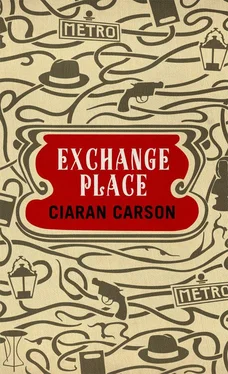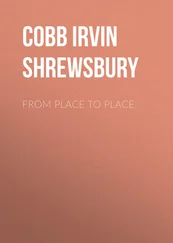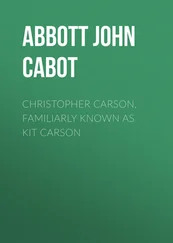Contrapunctus XIV , said Kilpatrick. Yes? said Gordon. Well, said Kilpatrick, the café where I met Freddy Gabriel, it was playing on the sound system, it’s the last movement of The Art of Fugue , Freddy came in on the last few bars. Did he now? said Gordon. I wouldn’t put it past Freddy to have engineered it, set it up as a conversation piece. Whatever the case, it goes to show us yet again that there’s no such thing as coincidence, said Gordon. Everything’s part of a larger narrative. We’re all trying to make sense of what we see, but of course the visual input and the means of processing it are extraordinarily complex, multiple feedback loops at every stage of the hierarchy. Let’s say there’s a black box at every stage. But you open the black box, and what does it contain? Why, a whole labyrinth of smaller black boxes. So we sort out what’s what by going through a series of iterations, eliminating those that don’t fit the parameters as we think of them. We seem to see things in a split second, but there’s any number of other split seconds behind that one. It’s as if each of us is hallucinating all the time and what we call perception involves merely selecting the one hallucination that best matches the current input, a plausible narrative if you like. Makes sense to us, anyway. So let me posit a little scenario.
A writer, let us call him K, said Gordon, is spending a sojourn in Paris. He is researching a book about Paris which will include extracts from books set in Paris, matching them to the relevant locations. It is an enterprise of some complexity, for sometimes the correspondence between extract and location is tenuous, especially in works of fiction; or the location has changed, or has been redeveloped beyond all recognition. The Les Halles quarter is a case in point. No matter. K enjoys these investigations of how things appear in books and how they appear in the world, sometimes imagining himself to walk in the footsteps of a fictional character and seeing the world through his eyes. He could be in a motion picture, complete with incidental music: a Bach fugue, say, for all that K’s memory of the piece is impressionistic and diverges somewhat from an actual performance. No matter. In his mind they set the atmosphere. For a while things go unremarkably. He visits places he has visited in the past, and loses himself in places he has never been. He describes these peregrinations in a notebook. One day he sees a man who bears an uncanny resemblance to someone who once played an important role in K’s life. He gives the man a name, John Bourne. The man vanishes. One thing leads to another … But we have arrived at our location, said Gordon. He pushed a button on the armrest and it slid open to reveal a radio. L’oiseau chante avec ses doigts , he said into it, and the radio replied, Et l’homme chant avec ses ailes .
The limousine came to a halt by a piece of wasteland. It was a quarter of Paris unfamiliar to Kilpatrick. As in a bomb site from some war or other, tall ruined buildings stood at one end of a skyline overlooking an area of rusted metal and broken masonry. The two men picked their way through the rubble. Here, said Gordon. He scuffled a few bricks out of the way to reveal a cast-iron manhole cover. Kilpatrick could not read the writing, but it looked ancient. Gordon produced two long iron T-shaped bars from his pocket. He gave one to Kilpatrick. Takes two to shift it, he said. Put the key in the slot, like this, he said, and he did so. Kilpatrick followed suit. They heaved together, and the iron lid came off not without struggle. It clanked heavily when they lowered it to the ground. Gordon replaced the keys and produced an electric torch from his pocket. I’ll light the way, he said, and Kilpatrick could see in the yellow beam a series of iron rungs going down until they disappeared into darkness. He followed Gordon down the ladder, rung after rung, until they landed in a chamber lined with shelves on which were arrayed human skulls. Old catacombs, said Gordon, there’s a veritable labyrinth of them down here. We go this way. He opened a door with another key from his pocket and they entered a winding passageway. A winding stair. Yet another door, another key. Nearly there, said Gordon. They came to another door again. Gordon halted before it, switched off his torch, and the door swung open of its own accord. Take my hand, and watch the step, said Gordon, as they stepped down into a room that was completely dark.
Welcome, said a voice, and Kilpatrick knew he had heard the voice before, not the voice but the shadow of a voice he knew behind this older one. Scenes from the past of that voice flickered before his eyes and he heard John Bourne talking of the music of Bach, of the structure of cannabis sativa , of the painting of Francis Bacon, of Glenn Gould’s consumption of pharmaceutical drugs and Francis Bacon’s passion for gambling, of Hermes the God of Chance, of the one hundred billion neurons in the human brain … Identify yourselves, said the voice. Paul Gordon, said Gordon. And the other? said the voice. Gordon nudged Kilpatrick. John Kilpatrick, said Kilpatrick. There was a pause of a second that seemed an eternity.
Long time no see, said John Bourne.
As I stood in the vestibule of 14 Exchange Place, lost for a moment in a lost time, I heard the Albert Clock tolling the hour as it had done, hour by hour, for the fugitive protagonist of Odd Man Out . I counted three strokes. I looked at my watch. It read four. Spring forward, Fall back. I realised I’d forgotten to turn the clock back last night, the last Sunday in October, Hallowe’en as it happened. Today was All Saints’ Day. Then I remembered that the same thing had happened to me when I wrote in the missing notebook, when was it? One or two or three years ago, years that had passed in a blur so that it seemed to me only yesterday. I could hardly tell one year in the past decade or two from another; as we age, subjective time accelerates. The summers of our childhoods seem to stretch forever; now they seem over before they have begun. On the other hand, when we are abroad, away from our routine existence, time seems to slow; every day is full of incident, new things to see, and a week seems a month. And indeed, the three days of my enforced absence from home, when I was abroad as it were, seemed much longer than that. As it was, I had an hour to kill. I set my watch to three o’clock, the Omega likewise, sat down on the stairs, and took Harland’s notebook from my briefcase. It was still pouring rain outside.
I opened the notebook at random and glanced at the handwriting that was still familiar to me after all these years, a formal miniscule out of character with his ostensibly open face, and the broad strokes and swirls of his painting. I had remarked on it to Harland once and he said he had modelled it on the tiny handwriting of Walter Benjamin. He said it disciplined his thoughts, and he then showed me a book he was reading, written by a Lisa Fittko, who had helped Benjamin escape through the Pyrenees. Benjamin had spent some time in Lourdes before embarking on that fatal journey. The hotels and boarding houses of the town, usually catering almost exclusively to Catholic pilgrims, were packed with refugees, many of whom were Jewish: one of those bizarre displacements that happen in times of war. It was September 1940. Benjamin had already tried and failed to escape through Marseilles, a city in whose apocalyptic atmosphere, said Fittko, there were new stories every day about absurd escape attempts; plans involving fantasy boats and fictitious captains, visas for countries not found on any map, and passports issued by nations which no longer existed. She referred to Benjamin as ‘Old Benjamin’ — she didn’t know why, since Benjamin was only forty-eight or so, she said, the age that Harland and I were at the time, and we certainly didn’t think of ourselves as old. Yet the photograph of Benjamin in the book showed a man who looked much older and wiser than us, wearing wire-rimmed glasses, his hair rising from the high brow in a shock of convoluted waves shot with grey, the very image of an intellectual.
Читать дальше












